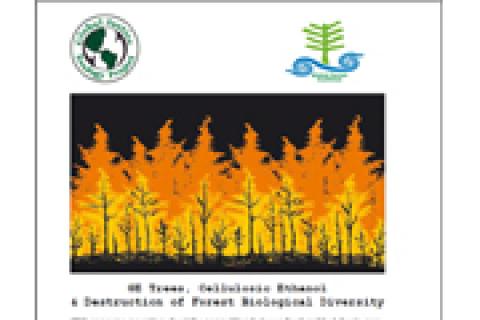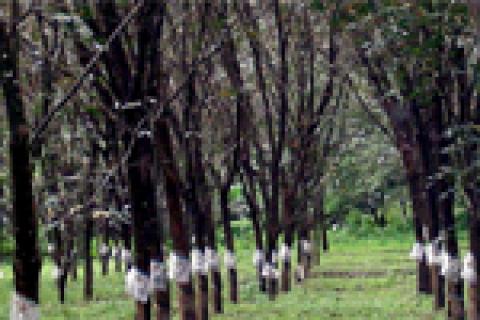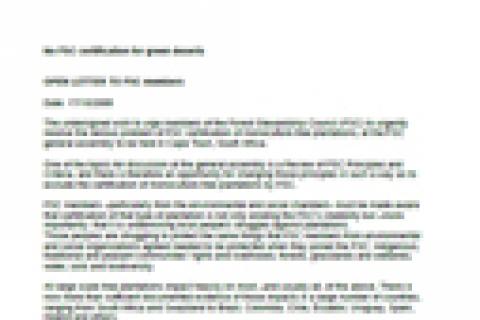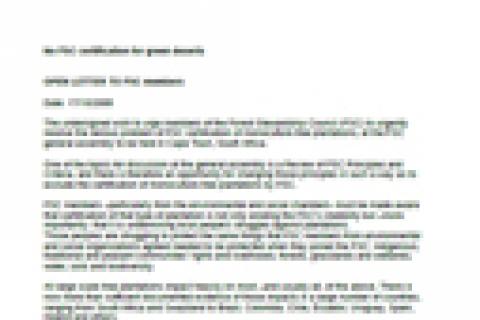Lake Chini is dying. The beautiful lake in the state of Pahang is one of the only two large natural freshwater bodies in Malaysia --and is dying. It used to teem with fish and other aquatic animals and plants and has been the home of indigenous communities, the Jakuns. Various human activities have contributed to the pollution of Lake Chini especially the establishment of a dam. However one contributing factor has been the pesticides and fertilisers used in the oil palm plantations fringing the lake and in many places next to the water.
Other information
Yesterday I could cry and shed watery tears
I could labour and freely shoot watery sweat
But today
Not so, not so
Riverbeds turned dustbowls
Rivers diverted into private throats
Creeks turned into rivers of salt
I sweat blood
And weep dry-eyed
Our fathers and forefathers and mothers and grandmothers say waters from
Streams and rivers, creeks and lagoons
In their days
Were clear, odourless, tasteless, healthy
In their days
The proposed Phulbari open pit coal mine in Bangladesh would divert a river, suck an aquifer dry for 30 years and evict thousands of people from their homes. Vast machines would dig a series of holes 300 metres deep over a total area of 59 square kilometres. The coal would be largely exported via a railway and port in the Sundarbans, the world's largest mangrove forest.
By Global Justice Ecology Project and Global Forest Coalition - February 2008.
With concerns mounting about the competition between food and fuel due to cropbased agrofuels, the cellulosic ethanol industry is heavily promoting fuel produced from woody sources such as trees as the solution to this conflict.
By Ms Sayamol Kaiyoorawong and Ms Bandita Yangdee - Project for Ecological Awareness Building
Even capitalists now admit the oil crisis is real. But their solutions border on lunacy as they avoid the obvious answer
By George Monbiot, The Guardian, February 2008
Commentary on CBD/SBSTTA/INF/6 Paper on Potential Impacts of GE Trees
Prepared for CBD SBSTTA Meeting, Rome, Italy, 18-22 February, 2008
This document is a joint commentary prepared by those organizations involved in the CBD process that are urging for clear moratorium on the open release of GE trees, and was written in response to the INF-6 background document, to highlight areas of particular relevance and to point out areas where information has not been included or considered.
Indonesia: Call for Action against certification of Riau Andalan Pulp and Paper’s timber plantations
The giant pulp company PT. Riau Andalan Pulp and Paper (PT. RAPP), operating in Riau Province, is applying for a Plantation Forest Management Certificate from the Indonesia Ecolabeling Institute (LEI) Certification System.
Riau-based NGOs and several regional and national NGOs are strongly challenging the application on several grounds including:
Increased poverty, land conflicts and deforestation: The Asian Development Bank's plantations record
The ADB has handed out more than US$1 billion for forestry projects since its first forestry project in 1977. Most of the Bank's recent forestry projects were rated "partially successful or unsuccessful". The Bank acknowledges "problems with project design and implementation" and that "its [forestry] sector investments have had a minimal positive impact on forest loss and degradation". Even this "minimal positive impact" is a result of defining a plantation as a forest.
The major issue of land tenure underlies the problem of oil palm schemes in Indonesia and elsewhere. Occupying large tracts of community land where food and cash crops used to be grown and medicines and building materials were harvested, monoculture oil palm plantations erode the rights and livelihoods of local communities.
Through promises, bribes, and cheating combined with the unawareness of local communities of their rights, companies move in leading to the large-scale privatisation of land and natural resources.
The pulp and paper company ENCE owns monoculture eucalyptus plantations in Spain and Uruguay, certified by FSC. Part of these plantations, some 12,000 hectares spread out among over 200 plots, are located in the Northeast of Spain (Galicia, Asturias and Cantabria) and are managed by one of its forestry subsidiary companies, NORFOR.
The recent study “Rights of rubber farmers in Thailand under free trade”, by Ms Sayamol Kaiyoorawong and Ms Bandita Yangdee, [http://www.wrm.org.uy/countries/Thailand/Rights_of_rubber_farmers_in_Thailand.pdf],makes a thorough review of the whole rubber business and its actors in that country.




